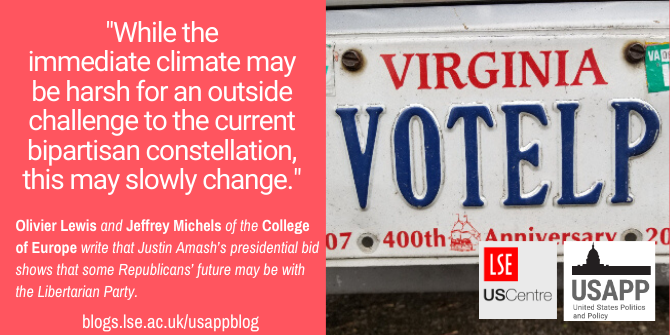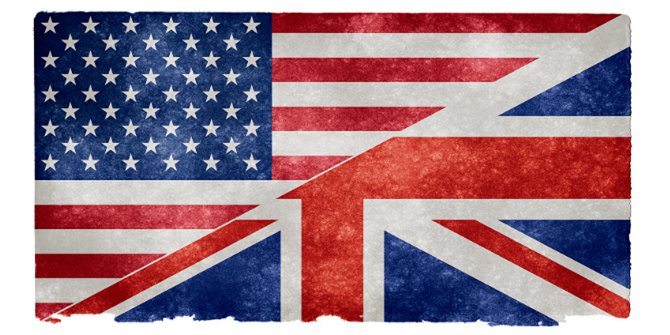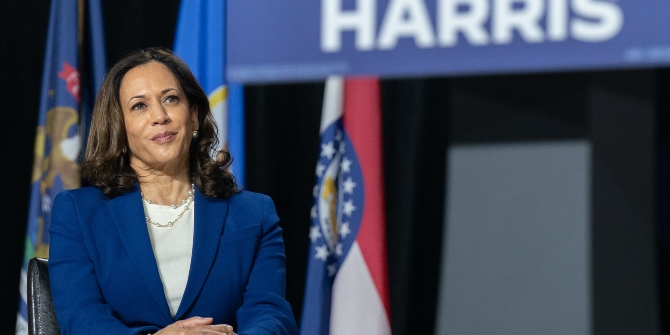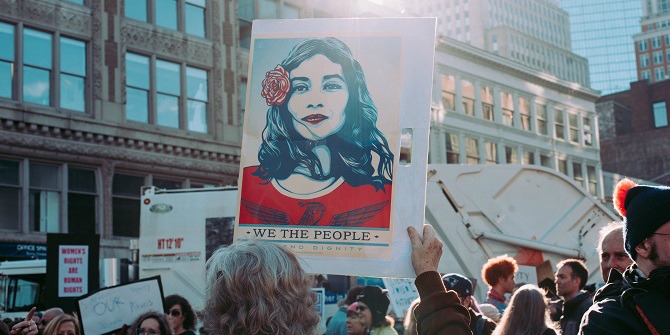
 With Republican and Democratic voters rallying around their party’s respective presidential candidates ahead of the November election, the chances of a victory for the Libertarian Party look bleak. While the Libertarian Party may not be successful this fall, write Olivier Lewis and Jeffrey Michels, former Republican Justin Amash’s recent short-lived candidacy for the party may point to a longer term realignment for Republican voters who seek less government involvement in their lives.
With Republican and Democratic voters rallying around their party’s respective presidential candidates ahead of the November election, the chances of a victory for the Libertarian Party look bleak. While the Libertarian Party may not be successful this fall, write Olivier Lewis and Jeffrey Michels, former Republican Justin Amash’s recent short-lived candidacy for the party may point to a longer term realignment for Republican voters who seek less government involvement in their lives.
- This article is part of our Primary Primers series curated by Rob Ledger (Frankfurt Goethe University) and Peter Finn (Kingston University). Ahead of the 2020 election, this series explores key themes, ideas, concepts, procedures and events that shape, affect and define the US presidential primary process. If you are interested in contributing to the series contact Rob Ledger (ledger@em.uni-frankfurt.de) or Peter Finn (p.finn@kingston.ac.uk).
After a 12-hour-long nominating convention on May 22-23, the first held in cyberspace, the Libertarian Party selected psychology lecturer Dr Jo Jorgensen as its candidate for President of the United States. Following a night’s rest, the delegates returned to their computers to select self-proclaimed anarchist Spike Cohen as their Vice-Presidential candidate. The delegates’ stamina was impressive, especially considering the fact that their ticket has virtually no chance of winning the presidential elections in November.
The obstacles are even greater in this extraordinary election year. Some of this is inherent to the race itself. A growing number of Republican voters have a favourable view of President Donald Trump, and a vast majority of Democrats have a favourable opinion of former Vice-President Joe Biden. Unlike in 2016, this year’s “third-party candidates” will receive few protest votes; the Republican and Democratic candidates are simply too appealing to their respective party faithful.
Meanwhile the COVID-19 pandemic has further complicated the prospects for third parties. With many states under lockdown and social distancing customary throughout the country, third parties are unable to collect the signatures necessary to get their candidates’ names on state ballots – the Libertarian Party stopped petitioning on March 7th. These parties will need to turn to the courts, in the hope of lifting signature requirements. The Green and Libertarian parties did so with success in Illinois.

“Vote Libertarian Party” by Eli Christman is licensed under CC BY 2.0
The many social consequences of the health crisis will most likely limit support for third party campaigns. Due to COVID-19, the US population is, to a historic extent, politically polarized, prone to saving, jobless, and hungry. As a result, the electorate lacks the patience and resources to back outsider campaigns with little prospect for success. These are likely the “circumstances” that the ex-Republican congressman from Michigan, Rep. Justin Amash, had in mind when he announced on Twitter on May 16th that he was folding his “exploratory committee to seek the Libertarian Party’s presidential nomination”.
While the immediate climate may be harsh for an outside challenge to the current bipartisan constellation, this may slowly change. As we wrote earlier this month, Amash’s short-lived candidacy reveals a small but meaningful rift within the Republican Party, whose support of President Trump has often overruled its commitment to libertarian ideals. Questions surrounding the role of government in public and private life can lead to significant conflict amidst Republicans, especially as the party decides whether to follow the course Trump laid out during his presidency.
The COVID-19 pandemic is likely to exacerbate this rift in the longer term. Crisis measures undertaken by governments worldwide have reinforced and accelerated a shift away from libertarian values: the trend is towards less migration and free trade, and more capital controls, state aid and public debt. In the US, we can already see old debates re-emerge regarding threats to personal liberties and excessive government intervention, and this, most of all, in conservative American media. Michael Dougherty of the National Review summarises this as a debate between national autonomy and individual autonomy. Jack Butler, also writing for the Review, boils it down to blue-collar versus white-collar. Can these tensions be reconciled within the Republican Party? A historic pandemic has led to a historic recession, which has led to a historical governmental response. It is only logical that the political repercussions will be historic too, though they may take an election cycle to be felt.
Please read our comments policy before commenting.
Note: This article gives the views of the author, and not the position of USAPP – American Politics and Policy, nor the London School of Economics.
Shortened URL for this post: https://bit.ly/2ySbReY
 Olivier Lewis – College of Europe
Olivier Lewis – College of Europe
Olivier has been a Research Fellow at the College of Europe, Natolin campus, since August 2019. Olivier is currently writing his first book, Security Cooperation between Western States, to be published with Routledge. He is also working on shorter publications related to counterterrorism, counterinsurgency, and Brexit.
 Jeffrey Michels – College of Europe
Jeffrey Michels – College of Europe
Jeffrey Michels is a Parliamentary Assistant at the European Parliament and an Academic Assistant for the European Interdisciplinary Studies Department at the College of Europe.






